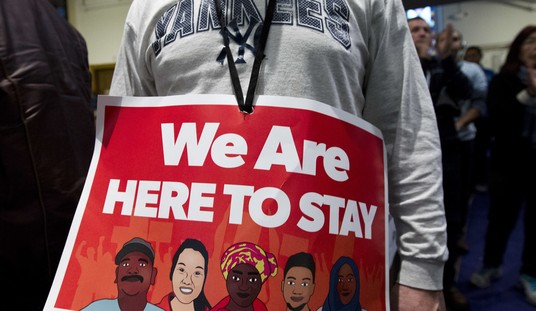This story has been percolating for a couple of weeks, ever since Alberto Nisman was found in a pool of blood in his apartment on January 18th. At first, the Argentine government said it was a suicide, but that story quickly fell apart. The prosecutor had put together a case against Iran for the 1994 bombing of a Jewish cultural center in Buenos Aires, complete with allegations that the government of Cristina Fernandez de Kirchner had attempted to shut down the investigation. Now, prosecutors have confirmed that Nisman had at one time drafted a motion to have Fernandez arrested for her part in the conspiracy:
An Argentine prosecutor found dead under mysterious circumstances last month had drafted a request that President Cristina Fernández de Kirchner be arrested on allegations of conspiring to derail his probe into the deadly 1994 bombing of a Jewish center, the investigator into his death said Tuesday.
The papers were found in the trash at Alberto Nisman’s apartment while his property was being scoured for clues to whether the father of two had committed suicide or was murdered.
That reverses a previous claim that no such order existed. Lead investigator Viviana Fein’s own office denounced an earlier report of this request, and the Fernandez government did the same. Yesterday, though, Fein herself announced that the paperwork for the request had been found on the scene and is still included in the case file.
What did Nisman have on Fernandez? Let’s just say that the New York Time’s Simon Romero lays out the timing well enough to make it clear, as does this brief video:
The 26-page document, which was found in the garbage at Mr. Nisman’s apartment, also sought the arrest of Héctor Timerman, Argentina’s foreign minister. Both Mrs. Kirchner and Mr. Timerman have repeatedly denied Mr. Nisman’s accusation that they tried to reach a secret deal with Iran to lift international arrest warrants for Iranian officials wanted in connection with the bombing.
The new revelation that Mr. Nisman had drafted documents seeking the arrest of the president and the foreign minister illustrates the heightened tensions between the prosecutor and the government before he was found dead on Jan. 18 at his apartment with a gunshot wound to his head. He had been scheduled the next day to provide details before Congress about his accusations against Mrs. Kirchner.
“It would have provoked a crisis without precedents in Argentina,” said Sergio Berensztein, a political analyst, about the impact of the arrest requests if they had been issued. He noted that previous legal cases had shaken Argentina’s political establishment, but he emphasized that this case involved a request to arrest a sitting president.
“It would have been a scandal on a level previously unseen,” Mr. Berensztein said.
The real scandal might be that a sitting president could be covering up for terrorists that attacked her own country. Iran has long been suspected of being behind the attack on Argentinian Jews in 1994. They have in recent years attempted to expand their diplomatic and clandestine influence in Latin America as well, hoping to find ways around Western embargoes and to challenge the US in its own hemisphere. If Nisman had evidence that Fernandez was covering up for Iran, it also puts Iran into the category of those who benefited from his murder — and it wouldn’t be the first time their assassins had worked in Argentina, obviously.
Meanwhile, Nisman’s case had already been submitted before his death. Despite his courage and his sacrifice, it appears that judges in Argentina are reluctant to take up the case (via Fausta):
An Argentinian judge has refused to pursue allegations that president Cristina Fernández de Kirchner conspired with Iran to cover up the nation’s deadliest terrorist attack – raising the prospect of the case dying along with the prosecutor who presented it. …
On Monday Judge Ariel Lijo declined to accept the indictment on technical grounds. Nisman had singled him out to handle the case, presumably because the judge was already investigating the earlier cover-up, but Lijo said the new accusations were beyond his jurisdiction.
Lijo said in a statement that “the mere fact it has some kind of link indirect or direct with the attack on the Amia, as in the present case” did not constitute sufficient grounds to tack Nisman’s charges on to the others.
A second judge – Daniel Rafecas – has also declined to take on the case, according to the domestic media, prompting several commentators to declare the indictment a poisoned chalice that nobody wants to accept.
The Guardian’s take on the refusals is that Nisman’s case looks pretty weak, and has some contradictions. Someone thought it was good enough to assassinate him for it, though. If Nisman’s case was that weak, why cover it up with his murder? It sounds more like a message to everyone else — and perhaps the judges have gotten that message.








Join the conversation as a VIP Member